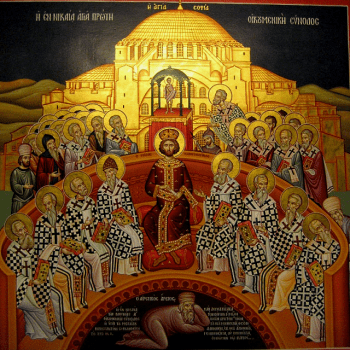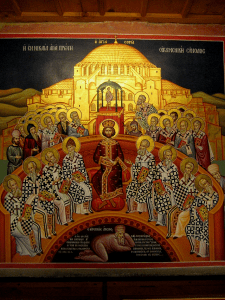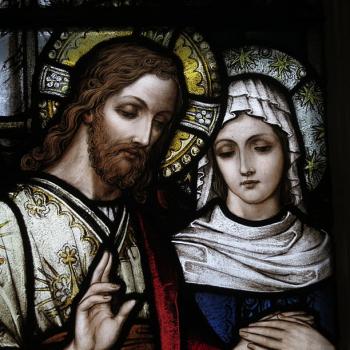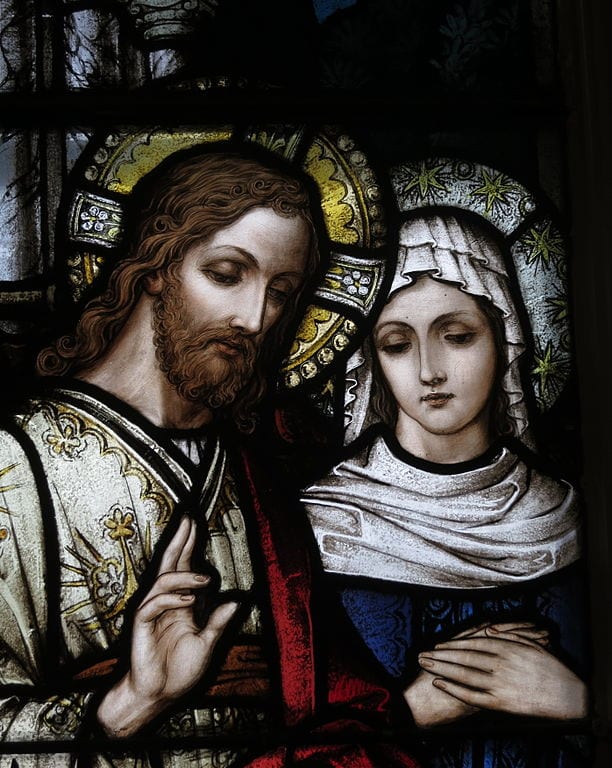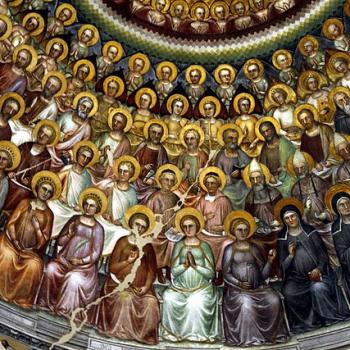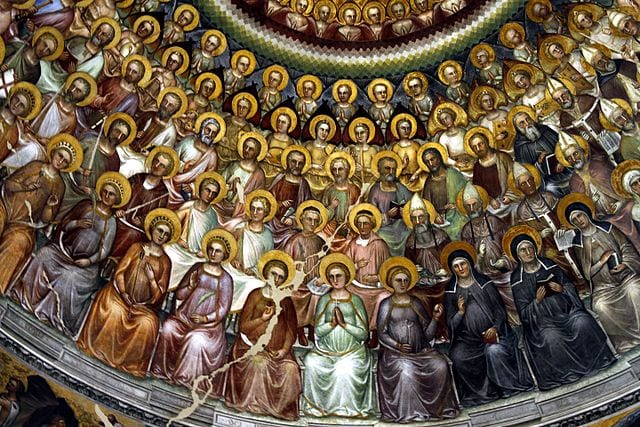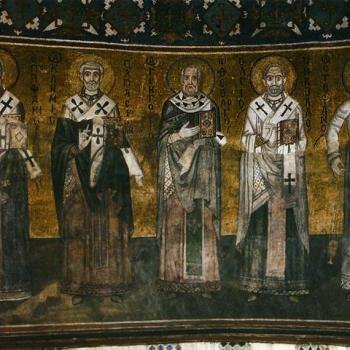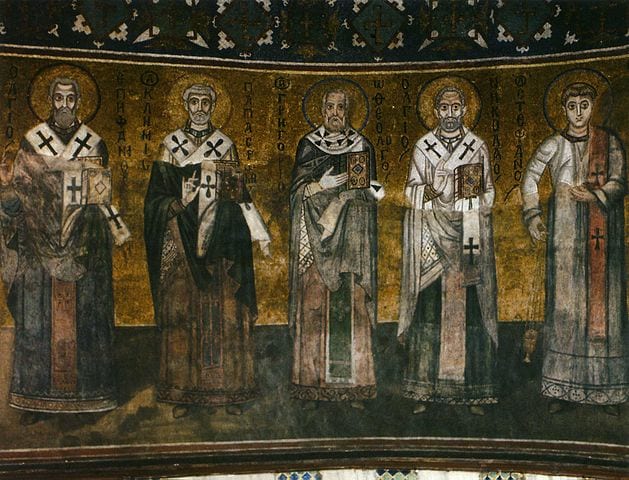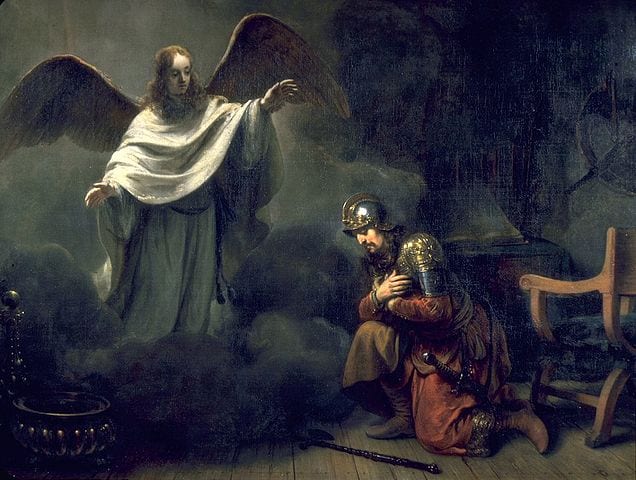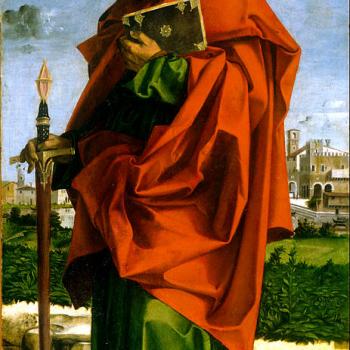Jason Engwer is a Protestant and anti-Catholic apologist, who runs the Tribalblogue site. I will be responding to several of his “anti-Mary” comments, as noted. His words will be in blue.
*****
Simeon’s prophecy in Luke 2:35 involves a negative assessment of Mary, not a positive one. It’s about a sword of division and judgment that will adversely affect Mary. See, especially, the use of sword imagery in Ezekiel. (combox comment, 12-14-16)
Luke 2:34-35 (RSV) and Simeon blessed them and said to Mary his mother, “Behold, this child is set for the fall and rising of many in Israel, and for a sign that is spoken against [35] (and a sword will pierce through your own soul also), that thoughts out of many hearts may be revealed.
Many Protestant Bible commentaries express not a hint of the irrational hostility to Mary that Jason blasphemously asserts here (a prophecy originating from God that contains a supposed “negative assessment of Mary”). Here is a sampling of those with a quite different take on this passage:
Ellicott’s Commentary for English Readers The announcement of the special sorrow that was to be the Virgin Mother’s portion, comes as the sequel to “the sign that is spoken against,” the antagonism which her Son would meet with. We may find fulfilments of it when the men of Nazareth sought to throw Him from the brow of their hill (Luke 4:29); . . . when she stood by the cross, and heard the blasphemies and revilings of the priests and people (John 19:26).
Expositor’s Greek Testament καὶ σοῦ, singles out the mother for a special share in the sorrow connected with the tragic career of one destined to be much spoken against (ἀντιλεγόμενον); this inevitable because of a mother’s intense love. Mary’s sorrow is compared vividly to a sword (ῥομφαία here and in Revelation 1:16, and in Sept[30], Zechariah 13:7) passing through her soul. It is a figure strong enough to cover the bitterest experiences of the Mater Dolorosa, . . .
Barnes’ Notes on the Bible The sufferings and death of thy Son shall deeply afflict thy soul. And if Mary had not been thus forewarned and sustained by strong faith, she could not have borne the trials which came upon her Son; but God prepared her for it, and the holy mother of the dying Saviour was sustained.
That the thoughts … – This is connected with the preceding verse: “He shall be a sign, a conspicuous object to be spoken against, that the thoughts of many hearts may be made manifest – that is, that they “might show” how much they hated holiness. Nothing so “brings out” the feelings of sinners as to tell them of Jesus Christ.
Cambridge Bible for Schools and Colleges Almost from the very birth of Christ the sword began to pierce the soul of the ‘Mater Dolorosa;’ and what tongue can describe the weight of mysterious anguish which she felt as she watched the hatred and persecution which followed Jesus and saw Him die in anguish on the cross amid the execrations of all classes of those whom He came to save!
Gill’s Exposition of the Entire Bible the sorrows she met with on account of her son: as he was a man of sorrows, so was she a woman of sorrows, from his cradle to his cross; and his sorrows, like so many darts, or javelins, rebounded from him to her, and pierced her soul through;
Vincent’s Word Studies A sword (ῥομφαία). Strictly, a large Thracian broadsword. Used in Septuagint of the sword of Goliath (1 Samuel 17:51). A figure of Mary’s pang when her son should be nailed to the cross.
John Calvin’s Commentaries This warning must have contributed greatly to fortify the mind of the holy virgin, and to prevent her from being overwhelmed with grief, when she came to those distressing struggles, which she had to undergo. . . . She was not overwhelmed with grief; but it would have required a heart of stone not to be deeply wounded: . . .
Adam Clarke’s Commentary [A]s this is a metaphor used by the most respectable Greek writers to express the most pungent sorrow, it may here refer to the anguish Mary must have felt when standing beside the cross of her tortured son: John 19:25.
John Wesley’s Notes on the Bible A sword shall pierce through thy own soul – So it did, when he suffered: particularly at his crucifixion.
Dom Bernard Orchard’s Catholic Commentary of 1953 offers particularly insightful commentary:
So far all has been on a note of joy and welcome; now there is a promise of tragedy, strife and the sword. Simeon thus gives a more complete picture of OT predictions. Note ‘is set’ (κεῖται) is pre-ordained; perhaps he has in mind such texts as Is 8:14.; 28:16; Ps 117:22; cf. Mt 21:44. Some have put 35a in parenthesis for fear of attributing anything derogatory to Mary; Origen and some of the ancient commentators, thinking of Mk 3:21, interpreted the words as foretelling that she would be tempted to doubt her Son. But it seems more probable that 35b applies to all the preceding; as Jesus will later say, contact with him reveals all hearts, i.e. the dispositions of soul in each one. There can be no neutrality; everyone must come to a decision. The same idea is in the Magnificat. But it is only natural that the heart of Mary will be pierced with sorrow by the opposition shown to her Son. Tongues of enemies are like a sharp sword, Ps 56:5; 63:4.
It’s probably not a coincidence that the incident of 2:48-50 and its surrounding context follow so soon after the account involving Simeon’s prophecy. 2:48-50 opens with a quotation of Mary’s inappropriate comments in verse 48, followed by Jesus’ rebuke of her in verse 49, and concludes with Luke’s comments about her ignorance in verse 50. . . . And that passage is likely intended by Luke to be an illustration of how the sword of division and judgment affected Mary. (combox comment, 12-14-16)
Luke 2:45-50 and when they did not find him, they returned to Jerusalem, seeking him. [46] After three days they found him in the temple, sitting among the teachers, listening to them and asking them questions; [47] and all who heard him were amazed at his understanding and his answers. [48] And when they saw him they were astonished; and his mother said to him, “Son, why have you treated us so? Behold, your father and I have been looking for you anxiously.” [49] And he said to them, “How is it that you sought me? Did you not know that I must be in my Father’s house?” [50] And they did not understand the saying which he spoke to them.
Jason seeks to attach blame to the Blessed Virgin Mary based on this text. I addressed the topic in my paper, Jason Engwer and a Supposedly Sinful Mary (11-16-20):
I don’t think “why have you treated us so?” is necessarily (wholly apart from theology and viewed logically and grammatically) an accusation of sinfulness on Jesus’ part at all. Mary and Joseph were simply (undeniably) perplexed, but it doesn’t follow that they were therefore accusing Jesus of sin. After all, all Christians believe that God is sinless, yet we are often perplexed by His words or actions or lack of answers to prayers, etc. None of that automatically means that we accuse God of sin.
We’re simply confused and lacking answers and full knowledge, while we accept certain mysteries in faith and the fact that God’s ways are much higher than ours. So they asked, “why have you treated us so?” They didn’t understand. And I’m sure they would have been the first to admit that they wouldn’t always fully understand God the Son.
The 1953 Catholic Commentary, edited by Dom Bernard Orchard, noted:
Mary and Joseph are also amazed. . . but Lk gives the reason in 48b: Jesus has never behaved so to Mary before. It is to be remembered that with her, as with others, Jesus had conducted himself as a normal child; his divinity was to her, as to us, an object of faith and not vision. . . . 51b also throws light on the point. ‘They learnt only gradually what his Messiahship involved (cf. 2:34–35) and this is one stage in the process. From the point of view of her subsequent knowledge, Mary recognized that she and Joseph had not understood’ (Plummer ICC on 2:51).
Pope St. John Paul II offers further explanation:
Several early Fathers of the Church, who were not yet convinced of her perfect holiness, attributed imperfections or moral defects to Mary. Some recent authors have taken the same position. However, the Gospel texts cited to justify these opinions provide no basis at all for attributing a sin or even a moral imperfection to the Mother of the Redeemer.
Jesus’s reply to his mother at the age of 12: “How is it that you sought me? Did you not know that I must be in my Father’s house?” (Lk 2:49), has sometimes been interpreted as a veiled rebuke. A careful reading of the episode, however, shows that Jesus did not rebuke his mother and Joseph for seeking him, since they were responsible for looking after him.
Coming upon Jesus after an anxious search, Mary asked him only the “why” of his behaviour: “Son, why have you treated us so?” (Lk 2:48). And Jesus answers with another “why”, refraining from any rebuke and referring to the mystery of his divine sonship. (“Mary Was Free from All Personal Sin,” 6-26-96)
Regarding Mary’s alleged knowledge of what Jesus would do, Tertullian referred to “a want of evidence of His mother’s adherence to Him…their [Mary and Jesus’ brothers] unbelief is evident…they set small store on that which [Jesus] was doing within [the house in Matthew 12:46-50]…they prefer to interrupt Him, and wish to call Him away from His great work” (On The Flesh Of Christ, 7). He goes on to criticize Mary and Jesus’ brothers for “the importunity of those who would call Him away from His work”, and he goes on to remark, “When denying one’s parents in indignation [as Jesus did in Matthew 12], one does not deny their existence, but censures their faults….in the abjured mother there is a figure of the synagogue, as well as of the Jews in the unbelieving brethren. In their person Israel remained outside, whilst the new disciples who kept close to Christ within, hearing and believing, represented the Church, which He called mother in a preferable sense and a worthier brotherhood, with the repudiation of the carnal relationship” (ibid.). (combox comment, 12-14-16)
Matthew 12:46-50 While he was still speaking to the people, behold, his mother and his brothers stood outside, asking to speak to him. [48] But he replied to the man who told him, “Who is my mother, and who are my brothers?” [49] And stretching out his hand toward his disciples, he said, “Here are my mother and my brothers! [50] For whoever does the will of my Father in heaven is my brother, and sister, and mother.”
I dealt with this in my paper, “Who is My Mother?”: Beginning of “Familial Church”. Here is the gist of my argument:
James Spencer Northcote comments on these passages:
We are quite at liberty to imagine, if we like, that Our Lord, after uttering the words which the Evangelists have recorded, rose up and proceeded to grant His Mother the interview she had asked for; there would be nothing at all strange in such a supposition; on the contrary, it is more possible than not; but it is not certain. All that we are told is that He answered the interruption in these words, “Who is My mother and My brethren? And then looking round about on them who sat about Him, He saith, Behold My mother and My brethren. For whosoever shall do the will of God, he is My brother, and My sister, and mother.”
I need not say that these words were not really an answer sent to His mother and brethren, but rather a lesson of instruction addressed to those “who sat about Him;” nor can it be necessary to point out to anyone who is familiar with the Gospels, how common a thing it was with our Blessed Lord to direct His answers not so much to the questions that had been put forward, as to the inward thoughts and motives of those who put them; how sometimes He set aside the question altogether as though he had not heard it, yet proceeded to make it the occasion of imparting some general lesson which it suggested. This is precisely what He does now.
Jesus took this opportunity to show that He regarded all of His followers (in what would become the Christian Church) as family. Similarly, He told His disciples, “I have called you friends” (Jn 15:15). It doesn’t follow that this is “a rebuff of this kin” (i.e., his immediate family). He simply moved from literal talk of families to a larger conception and vision of families as those who do “the will of God.” Thus, Jesus habitually used “brethren” to describe those who were not His immediate family [I cite Matthew 5:47; 23:8; 25:40; 28:10; Luke 22:32; John 20:17] . . .
It’s not a rebuff of His mother and father and half-brothers and/or cousins . . .; it’s simply the beginning of the Body of Christ, and the Christian Church being regarded as one large, extended family.
There is nothing in this passage to suggest unbelief of the “brothers”; let alone His mother (though there is data about the cousins’ / half-brothers’ unbelief in other passages). All it says is that they wanted to see Him. How is that unbelief? Nor is it a rebuke, as explained. So Tertullian starts with unwarranted false premises and goes on to even worse false conclusions based on them.
John Chrysostom repeatedly accuses Mary of a variety of sins, and he doesn’t seem to think she was as knowledgeable as John Mark Reynolds claims:
“For in fact that which she [Mary] had essayed to do [in Matthew 12:46-50], was of superfluous vanity; in that she wanted to show the people that she hath power and authority over her Son, imagining not as yet anything great concerning Him; whence also her unseasonable approach. See at all events both her self-confidence and theirs.” (Homilies On Matthew, 44)
“For where parents cause no impediment or hindrance in things belonging to God, it is our bounden duty to give way to them, and there is great danger in not doing so; but when they require anything unseasonably, and cause hindrance in any spiritual matter, it is unsafe to obey. And therefore He answered thus in this place, and again elsewhere, ‘Who is My mother, and who are My brethren?’ [Matthew 12:48], because they did not yet think rightly of Him; and she, because she had borne Him, claimed, according to the custom of other mothers, to direct Him in all things, when she ought to have reverenced and worshiped Him. This then was the reason why He answered as He did on that occasion….And so this was a reason why He rebuked her on that occasion, saying, ‘Woman, what have I to do with thee?’ [John 2:4] instructing her for the future not to do the like; because, though He was careful to honor His mother, yet He cared much for the salvation of her soul” (Homilies On John, 21). (combox comment, 12-14-16)
Once again, there appears to be nothing in the text to suggest all of these nefarious supposed intentions or motivations of Mary. Once Jesus’ reply is properly exegeted in light of His similar behavior and utterances elsewhere, it is readily seen to not be a rebuke at all. If it’s not a rebuke, then there is no implied sin on Mary’s part, since her alleged “sin” — in the minds of these critics — seems to be predicated upon Jesus’ reply being a censure or rebuke.
As for John 2:4, this was not a rebuke, either, as Catholic apologist Jimmy Akin has ably explained.
I note also that no Church father, in the Catholic system of belief, is believed to be infallible. That’s reserved for Scripture and what is authoritatively taught by the Church at the highest levels (by popes and ecumenical councils in union with him). A Church father being incorrect, even on a matter as important as this, is no disproof whatsoever of Catholicism. It’s not even an inconsistency.
Even Jason concedes — at least in part — concerning these negative comments of some Church fathers towards Mary: “they’re more critical of Mary than I am. I agree with them that she’s a sinner, that passages like Matthew 12:46-50 and Luke 2:35 reflect negatively on her, etc., but I think some of the fathers sometimes were overly critical of her”. (combox comment, 12-14-16)
Athanasius refers to how sinfulness dominated mankind before the coming of Christ. He mentions Mary in passing, but not as somebody who was sinless. Rather, he cites Jeremiah and John the Baptist as examples of individuals who were delivered from sin in the womb. He doesn’t seem to think that Mary was sinless before Jesus’ incarnation: . . . [cites Four Discourses Against The Arians, 3:33] (More Early Sources On Whether Mary Was Sinless, 6-13-16)
This is similar to Martin Luther’s position later in his life on Mary’s immaculate conception (what I have described as “immaculate purification”). But note that since this sinlessness would begin at the moment Jesus was conceived (taking Jason’s description at face value), then Mary would have been sinless from that moment (which would include all of the biblical accounts describing her, including the Annunciation: by which time she was sinless, having conceived the Incarnate Son of God.
John Chrysostom:
“And moreover, none of these, not even His mother nor His brethren, knew Him as they ought; for after His many miracles, the Evangelist says of His brethren, ‘For neither did His brethren believe in Him.’ [John 7:5]” (Homilies On John, 22:1). (More Early Sources On Whether Mary Was Sinless, 6-13-16)
Mary was not one of Jesus’ “brethren” but rather, His mother. The Bible never states that she in particular did not believe in Him or His mission. To the contrary, from the beginning, she knew exactly Who He was (see my paper, Mary’s Knowledge About Jesus’ Divinity), and the Bible never gives the slightest hint that she wavered from this revealed knowledge. If she had, surely that would have been made clear, as the Bible never shrinks from revealing faults of even the most eminent people (Moses, Paul, Peter, David, Noah, etc.).
St. John Henry Cardinal Newman made several penetrating comments on the question of the Church fathers, tradition, and development of the doctrine of a sinless and immaculate Mary:
You will ask perhaps, ’Why then was there so much controversy about the doctrine or about its definition?’ . . . I do not see any difficulty in the matter. From the beginning of the Church even good and holy men have got involved in controversies of words. . . . The devotion to her has gradually and slowly extended through the Church; the doctrine about her being always the same from the first. But the gradual growth of the devotion was a cause why that doctrine, in spite of its having been from the first, should have been but slowly recognised, slowly defined. . . . ’The new devotion was first heard of in the ninth century.’ Suppose I say, ’The new doctrine of our Lord’s immensity, contradicted by all the Ante-nicene Fathers, was first heard of in the creed of St Athanasius?’ or ’The Filioque, protested against by the Orthodox Church to this day, was first heard of in the 7th Century?’ Whatever principle is adduced to explain the latter statement will avail for the first. . . . The Holy Ghost’s eternity is involved in His divinity; the Blessed Virgin’s immaculateness in her conception is involved in the general declarations of the Fathers about her sinlessness. If all Catholics have not seen this at once, we must recollect that there were at first mistakes among pious and holy men about the attributes of the Holy Spirit. . . . I fully grant that there is not that formal documentary evidence for the doctrine in question which there is for some other doctrines, but I maintain also that, from its character, it does not require it. (Letters & Diaries xix; To Arthur Osborne Alleyne, 15 June 1860)
[A]s to the antiquity of the doctrine. In the first ages original sin was not. formally spoken of in contrast to actual. In the fourth century, Pelagius denied it, and was refuted and denounced by St Augustine. Not till the time of St Augustine could the question be mooted precisely whether our Lady was without original sin or not. Up to his time, and after his time, it was usual to say or to imply that Mary had nothing to do with sin, in vague terms. The earliest Fathers, St Justin, St Irenaeus etc. contrast her with Eve, while they contrast our Lord with Adam. In doing this – 1. they, sometimes imply, sometimes insist upon, the point that Eve sinned when tried, and Mary did not sin when tried; and 2. they say that, by not sinning, Mary had a real part in the work of redemption, in a way in which no other creature had a share. This does not go so far as actually to pronounce that she had the grace of God from the first moment of her existence, and never was under the power of original sin, but by comparing her with Eve, who was created of course without original sin, and by giving her so high an office, it implies it. Next, shortly after St Augustine, the 3rd General Council was held against Nestorius, and declared Mary to be the Mother of God. From this time the language of the Fathers is very strong, though vague, about her immaculateness. In the time of Mahomet the precise doctrine seems to have been taught in the East, for I think he mentions it in the Koran. In the middle ages, when everything was subjected to rigid examination of a reasoning character, the question was raised whether the doctrine was consistent with the Blessed Virgin’s having a human father and mother – and serious objections were felt to it on this score. Men defined the words ’Immaculate Conception’ differently from what I have done above, and in consequence denied it. St Bernard and St Thomas, in this way, were opposed to it, and the Dominicans. A long controversy ensued and a hot one – it lasted many centuries. At length, in our time, it has been defined in that sense in which I have explained the words above – a sense, which St Bernard, St Thomas, and the Dominicans did not deny. The same controversy about the sense of a word had occurred in the instance of the first General Council at Nicaea. The Nicene Creed uses the word ’Consubstantial’ to protect the doctrine of our Lord’s divinity against Arius, which the great Council of Antioch some 70 years before had repudiated as a symbol of heresy. In like manner great Saints have repudiated the words ’Immaculate Conception,’ from taking them in a different sense from that which the Church has accepted and sanctioned. (Letters & Diaries xxii; To Lady Chatterton, 2 Oct. 1865)
This is what is often called development of doctrine. It is no where said e.g., by the early Fathers, that Mary was without sin – but they do say that she is the second Eve, and that also she is the contrary to Eve in not having fallen; from which the Church, under the gift of infallibility, deduces her sinlessness. And this deduction nevertheless might not seem necessary to Catholic believers on the first blush of the matter . . . (Letters & Diaries xxvii, 84; Letter to J. H. Willis Nevins, 25 June 1874)
Related Reading
*


